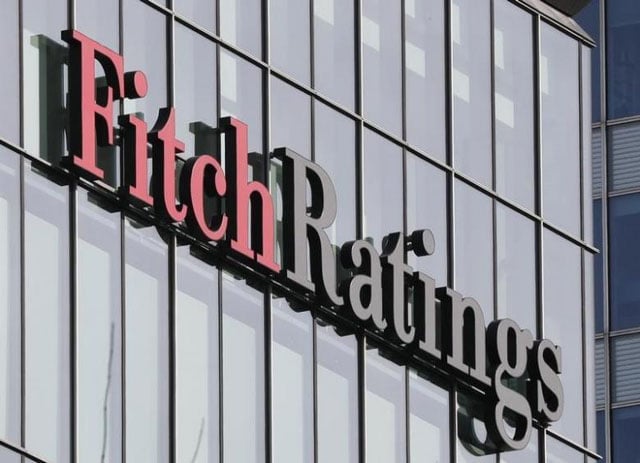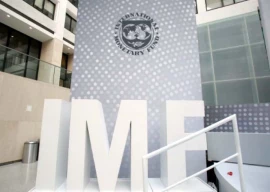
Global rating agency, Fitch, improved Pakistan’s credit rating by one notch on Monday but warned about risks in the implementation of the new International Monetary Fund (IMF) programme, arranging foreign loans and missing the new budget deficit target.
The fresh rating by Fitch – one of the world’s top three rating agencies – will help improve the perception but it will not bring any material change as Islamabad still remains in the “very high credit risk” category.
Fitch Ratings upgraded Pakistan’s Long-Term Foreign-Currency Issuer Default Rating (IDR) to CCC from CCC- [negative], according to a statement. Being in the high credit risk category, the Fitch Ratings did not assign outlook to Pakistan.
The agency said that the one notch upgrade reflects Pakistan’s improved external liquidity and funding conditions, following its staff-level agreement (SLA) with the IMF on a nine-month Stand-by Arrangement (SBA) in June.
“We expect the SLA to be approved by the IMF board in July, catalysing other funding and anchoring policies around parliamentary elections due by October, it said. “Nevertheless, programme implementation and external funding risks remain due to a volatile political climate and large external financing requirement.”
Finance Minister Ishaq Dar welcomed the upgrade in a tweet.“Another positive news towards current economic revival journey, God be praised,”he wrote on the microblogging website.
Read Fitch downgrades country’s IDR to 'CCC+'
Dar has said that the IMF board would take up Pakistan’s case for approval of the $3 billion programme on July 12. Until Monday, the IMF had not put Pakistan’s case on the board agenda, according to the meeting calendar that the IMF regularly updates.
A senior finance ministry official said that all the issues with the IMF have been sorted out and it might be a procedural matter to place Pakistan on the board’s calendar. So far, the IMF is scheduled to take up the issues of Germany’s Article IV consultation and Euro Area common policies on July 12.
Fitch said the IMF board’s approval of the SBA would unlock an immediate disbursement of $1.2 billion, with the remaining $1.8 billion scheduled after reviews in November and February 2024.
Fitch said that Pakistan had recently taken measures to address shortfalls in the revenue collection, energy subsidies and the policies that were inconsistent with a market-determined exchange rate, including import financing restrictions.
These issues held up the last three reviews of Pakistan’s previous IMF programme, before its expiry in June.
The government also amended its proposed budget for the fiscal year ending June 2024 to introduce new revenue measures and cut spending, following additional tax measures and subsidy reforms in February.
The authorities appeared to abandon exchange-rate management in January 2023, although guidelines on prioritising imports were only removed in June, it added.
However, Fitch warned that Pakistan had an extensive record of going off-track on its commitments to the IMF. “There is still scope for delays and challenges to implementation as well as new policy missteps ahead of the October elections and uncertainty over the post-election commitment to the programme’, according to Fitch.
Global Rating Agency “Fitch”
— Ishaq Dar (@MIshaqDar50) July 10, 2023
Upgrades Pakistan’s Long Term Foreign-Currency rating to CCC from IDR(Issuer Default Rating).
Another positive news towards current economic revival journey, AlhamdoLilah.
Congratulations to PM @CMShehbaz ,the Nation, Govt Allies & Economic Team 🌺
Fitch had a meeting with the finance ministry last week and it raised queries about Pakistan’s ability to arrange new foreign commercial loans and issuance of the sovereign bonds, the ministry sources said.
In its statement, Fitch said that Saudi Arabia and the United Arab Emirates (UAE) had committed another $3 billion in deposits, and the authorities expected $3 to 5 billion in other new multilateral funding after the IMF agreement.
The IMF SBA should also facilitate disbursement of some of the $10 billion in aid pledges made at the January 2023 flood relief conference, mostly in the form of project loans.
But it said that overall funding targets were ambitious, as the government expects $25 billion in gross new external financing in FY24, against $15 billion in public debt maturities, including $1 billion in bonds and $3.6 billion to multilateral creditors.
Fitch said that “the government funding target included$1.5 billion in market issuance and $4.5 billion in commercial bank borrowing, both of which could prove challenging”.
It added that $9 billion in maturing deposits from China, Saudi Arabia and the UAE would likely be rolled over, like the previous fiscal year.
Fitch said that Pakistan’s current account deficit could remain at $4 billion – much lower than the official target of $6 billion. It added that the reason “not all of the planned new funding will materialise, constraining imports”.
But it said that the current account deficit could widen more than expected, given the continued reports of import backlogs, dependency of the manufacturing sector on foreign inputs, and reconstruction needs after last year’s floods.
Currency depreciation could limit the rise of current account deficit, as the authorities intend for imports to be financed through banks, without recourse to official reserves, said Fitch. Remittance inflows could also recover after partly switching to unofficial channels to benefit from more favourable parallel market exchange rates.
But the credit rating agency said that foreign exchange reserves were still low. “We expect a modest recovery for the rest of FY24 on new external financing flows, although these flows will also lead to a renewed widening of the CAD.
Fitch said that the consolidated overall fiscal deficit could widen to 7.6% of GDP in fiscal year 2023-24, from an estimated 7% in the last fiscal year, driven by higher interest costs on domestic debt. The government has targeted 6.53% or Rs6.9 trillion budget deficit and Fitch projection is Rs1.1 trillion higher than the official estimates.
Fitch cited Ishaq Dar’s statement about seeking maturity extensions on loans by non-Paris Club bilateral creditors, while reaffirming the government’s commitment to timely debt service.
“We understand that such maturity extensions would mostly relate to loans and deposits by China, Saudi Arabia and the UAE, which are already regularly rolled over”, it added.
In 2022, the prime minister and former finance minister raised the possibility of seeking debt relief from non-commercial creditors, including the Paris Club, but the authorities now appear to have moved away from this.
Should Paris Club debt treatment be sought, the creditors are likely to require comparable treatment for private external creditors in any restructuring.

1729080111-0/BeFunky-collage-(63)1729080111-0-405x300.webp)
1730838202-0/Trump-(1)1730838202-0-165x106.webp)



















COMMENTS
Comments are moderated and generally will be posted if they are on-topic and not abusive.
For more information, please see our Comments FAQ